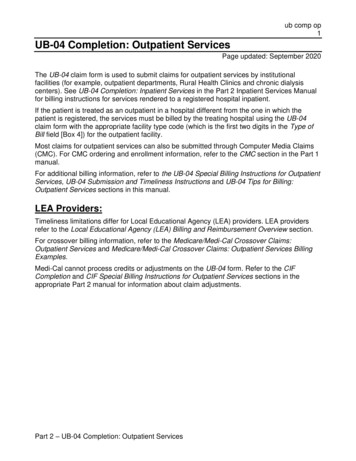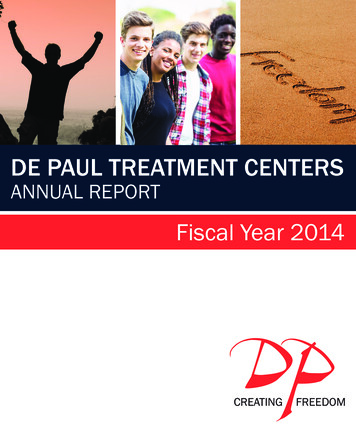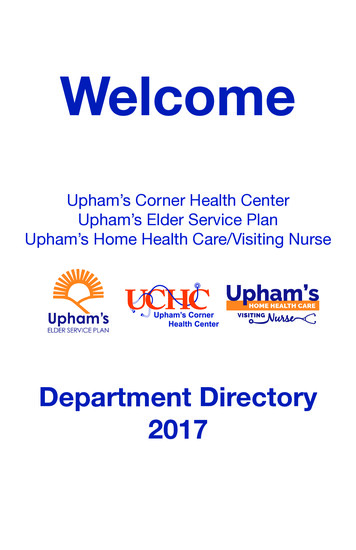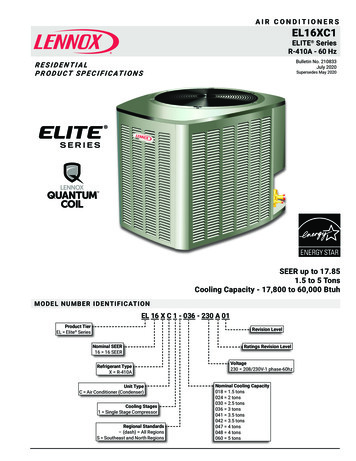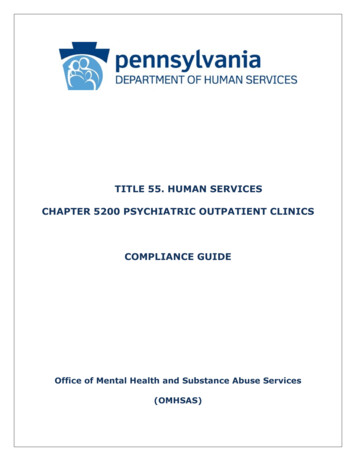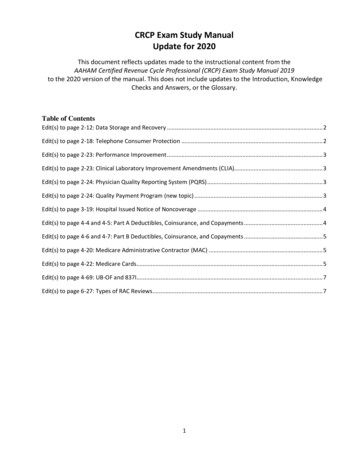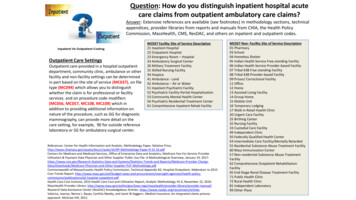
Transcription
PART 825INTEGRATED OUTPATIENT SERVICES(Statutory authority: Mental Hygiene Law §§ 19.07(c), 19.07(e), 19.09(b),19.21(b), 19.21(d). 19.40, 32.01, 32.07(a), 32.05(b), 32.09(b), Section 365-l(7) ofthe Social Services Law and Part L of Chapter 56 of the Laws of 2012)825.1Background and Intent825.2Legal ted Care Models825.6Organization and Administration825.7Treatment Planning825.8Policies and Procedures825.9Integrated Care Services825.10Environment825.11Quality Assurance, Utilization Review and Incident plication and Approval825.15Inspection
§ 825.1 Background and Intent(a) Physical and behavioral health conditions (i.e., mental illness and/or substance usedisorders) often occur at the same time. Persons with behavioral disorders frequentlyexperience chronic illnesses such as hypertension, diabetes, obesity, andcardiovascular disease. These illnesses can be prevented and are treatable. However,barriers to primary care, as well as the difficulty in navigating complex healthcaresystems, are a major obstacle to individuals with behavioral health disorders seekingtreatment for their physical conditions.(b) Primary care settings have, at the same time, become a gateway to the behavioralhealth system, as people seek care for mild to moderate behavioral health needs (e.g.,anxiety, depression, or substance use) in primary health care settings.Health care providers have long recognized that many patients have both physical andbehavioral health care needs, yet physical and behavioral healthcare services havetraditionally been provided and paid for separately. Even behavioral health serviceshave traditionally been treated in a bifurcated system (e.g. substance use disordertreatment is treated separately from mental health treatment).(c) The term “integrated care” describes the systematic coordination of primary andbehavioral health care services. The growing awareness of the prevalence and cost ofcomorbid physical and behavioral health conditions, and the increased recognitionthat integrated care can improve outcomes and achieve savings, has led to increasingacceptance of delivery models that integrate physical and behavioral health care.Moreover, most patients prefer to have their physical and behavioral health caredelivered in one place, by the same team of clinicians.
(d) Accordingly, these regulations will prescribe standards for the integration of physicaland behavioral health care services in certain outpatient programs licensed by theDepartment of Health, the Office of Mental Health, and/or the Office of Alcoholismand Substance Abuse Services.§ 825.2 Legal Base(a) Office of Mental Health.(1) Section 7.09 of the Mental Hygiene Law (MHL) grants the commissioner ofMental Health the power and responsibility to adopt regulations that are necessaryand proper to implement matters under his or her jurisdiction.(2) Section 7.15 of the MHL charges the commissioner of Mental Health with theresponsibility for planning, promoting, establishing, developing, coordinating,evaluating and conducting programs and services of prevention, diagnosis,examination, care, treatment, rehabilitation, training, and research for the benefit ofpersons with mental illness. Such law further authorizes the commissioner to take allactions that are necessary, desirable, or proper to carry out the statutory purposes andobjectives of the Office of Mental Health, including undertaking activities incooperation and agreement with other offices within the Department of MentalHygiene, as well as with other departments or agencies of state government.(3) Section 31.04 of the MHL authorizes the commissioner of Mental Health toset standards of quality and adequacy of facilities, equipment, personnel, services,records and programs for the rendition of services for adults diagnosed with mentalillness or children diagnosed with emotional disturbance, pursuant to an operatingcertificate.
(4) Sections 31.07, 31.09, 31.13, and 31.19 of the MHL authorize thecommissioner of Mental Health or his or her representatives to examine and inspectsuch programs to determine their suitability and proper operation. Section 31.16authorizes such commissioner to suspend, revoke or limit any operating certificate,under certain circumstances.(5) Section 31.11 of the MHL requires every holder of an operating certificate toassist the Office of Mental Health in carrying out its regulatory functions bycooperating with the commissioner of Mental Health in any inspection orinvestigation, permitting such commissioner to inspect its facility, books and records,including recipients’ records, and making such reports, uniform and otherwise, as arerequired by such commissioner.(6) Article 33 of the MHL establishing basic rights of persons diagnosed withmental illness.(7) Sections 364 and 364-a of the Social Services Law give the Office of MentalHealth responsibility for establishing and maintaining standards for medical care andservices in facilities under its jurisdiction, in accordance with cooperativearrangements with the Department of Health.(b) Department of Health. Section 2803 of the Public Health Law (PHL) authorizes thePublic Health and Health Planning Council to adopt and amend rules and regulations,subject to the approval of the commissioner, to implement the provisions of PHLArticle 28, and to establish minimum standards governing the operation of health carefacilities.(c) Office of Alcoholism and Substance Abuse Services.
(1) Section 19.07(c) of the MHL charges the commissioner of the Office ofAlcoholism and Substance Abuse Services with the responsibility to ensure thatpersons who abuse or are dependent on alcohol and/or substances and their familiesare provided with care and treatment that is effective and of high quality.(2) Section 19.07(e) of the MHL authorizes the commissioner of the Office ofAlcoholism and Substance Abuse Services to adopt standards including necessaryrules and regulations pertaining to chemical dependence treatment services.(3) Section 19.09(b) of the MHL authorizes the commissioner of the Office isAlcoholism and Substance Abuse Services to adopt regulations necessary and properto implement any matter under his/her jurisdiction.(4) Section 19.21(b) of the MHL requires the commissioner of the Office ofAlcoholism and Substance Abuse Services to establish and enforce regulationsconcerning the licensing, certification, and inspection of chemical dependencetreatment services.(5) Section 19.21(d) of the MHL requires the Office of Alcoholism and SubstanceAbuse Services to establish reasonable performance standards for providers ofservices certified by the Office.(6) Section 19.40 of the MHL authorizes the commissioner of The Office ofAlcoholism and Substance Abuse Services to issue operating certificates for theprovision of chemical dependence treatment services.(7) Section 32.01 of the MHL authorizes the commissioner of the Office ofAlcoholism and Substance Abuse Services to adopt any regulation reasonably
necessary to implement and effectively exercise the powers and perform the dutiesconferred by Article 32 of the MHL.(8) Section 32.07(a) of the MHL authorizes the commissioner of the Office ofAlcoholism and Substance Abuse Services to adopt regulations to effectuate theprovisions and purposes of Article 32 of the MHL.(9) Section 32.05(b) of the MHL provides that a controlled substance designatedby the commissioner of Health as appropriate for such use may be used by aphysician to treat a chemically dependent individual pursuant to section 32.09(b) ofthe MHL.(10) Section 32.09(b) of the MHL provides that the commissioner of Alcoholismand Substance Abuse Services may, once a controlled substance is approved by thecommissioner of Health as appropriate for such use, authorize the use of suchcontrolled substance in treating a chemically dependent individual.(d) Pursuant to section 365-l(7) of the Social Services Law and Part L of Chapter 56 ofthe Laws of 2012 the commissioners of the Office of Mental Health, Office ofAlcoholism and Substance Abuse Services and Department of Health are jointlyauthorized to establish operating, reporting and construction requirements, as well asjoint survey requirements and procedures for entities operating under the auspices ofone or more such agencies in order to integrate the delivery of health and behavioralhealth services in an efficient and effective manner.§ 825.3 Applicability
(a) The provisions of this Part shall apply to providers seeking approval to provideintegrated care services at a single outpatient site (host site). This includes: (i)locations licensed under PHL Article 28 as diagnostic and treatment centers,extension clinics as defined in paragraph (g) of section 401.1 of Title 10, and generalhospital outpatient programs as defined by this Part, (ii) substance use disorderoutpatient services certified under MHL Article 32 and (iii) clinic treatment programslicensed under MHL Article 31.(b) The standards apply to providers certified or licensed by at least two of the saidparticipating agencies or in the process of pursuing licensure or certification by theDepartment of Health, the Office of Mental Health or the Office of Alcoholism andSubstance Abuse Services.(c) The requirements of this Part shall be in addition to the requirements of the stateagency that licensed or certified the proposed host site.(d) An integrated service provider shall continue to ensure documentation as required per18 NYCRR sections 504.3, 517.3(b), 518.1(c), and 518.3(b).(e) Integrated services providers of mental health services shall continue to ensurecompliance with 14 NYCRR Part 599.(f) Integrated services providers of substance use disorder services shall continue toensure compliance with 14 NYCRR section 822.(g) With respect to billing for medical assistance, an integrated service provider shallcontinue to ensure compliance with 18 NYCRR sections 540.6(a) and 540.6(e).§ 825.4 Definitions
For the purposes of this Part:(a) “Behavioral health care” means care and treatment of mental illness and/or substanceuse disorders.(b) “Diagnostic and treatment center” means a medical facility as defined in 10 NYCRRsection 751.1 or an extension clinic as defined in 10 NYCRR 401.1(g).(c) “Governing authority” means the entity that substantially controls the operator orprovider of services and to which a state licensing agency has issued an operatingcertificate. The governing authority is the body possessing the right to appoint andremove directors or officers, to approve bylaws or articles of incorporation, toapprove strategic or financial plans for a provider or service, or to approve operatingor capital budgets for a provider of services.(d) “General hospital outpatient program” means a distinct part or unit within a generalhospital as defined by section 2801(10) of the Public Health Law through whichoutpatient services, other than hospital-based ambulatory surgery services, areprovided.(e) “Host Site” means a provider that is licensed or certified by the Department ofHealth, the Office of Mental Health or the Office of Alcoholism and Substance AbuseServices and is approved to provide integrated care services at a single outpatient site.(f) “Integrated care services” means the systematic coordination of evidence-basedphysical and behavioral health care in clinics licensed by one or more state licensingagencies in order to promote health and better outcomes, particularly for populationsat risk.
(g) “Integrated services provider” means a provider holding multiple operatingcertificates or licenses to provide outpatient services, who has also been authorized bya commissioner of a state licensing agency to deliver identified integrated careservices at a specific site in accordance with the provisions of this Part.(h) “Medical director” is a physician who is responsible for the medical services providedby the integrated services provider, for the overall direction of the medical proceduresprovided and the direct supervision of medical staff in the performance of medicalservices.(i) “Outpatient services” means clinic services provided by a diagnostic and treatmentcenter or general hospital outpatient program pursuant to PHL Article 28, a mentalhealth clinic licensed pursuant to MHL Article 31, or a substance use disorder cliniccertified pursuant to MHL Article 32.(j) “Primary care services” means services provided by a physician, nurse practitioner, ormidwife acting within his or her lawful scope of practice under Title VIII of theEducation Law and who is practicing primary care.(k) "State licensing agency" means the state agency with statutory authority to license orcertify a provider of outpatient services and designated in accordance with theprovisions of this Part with responsibility to monitor compliance by an integratedservices provider with the provisions of this Part. State licensing agency is limited tothe Department of Health, the Office of Mental Health, or the Office of Alcoholismand Substance Abuse Services, as applicable.§ 825.5 Integrated Care Models
Integrated services providers will be approved by the appropriate state licensing agencyand designated to deliver integrated care services as one of the following models:(a) Primary Care Host Model: Given the recognition that the general health care systemcan serve as a gateway to the behavioral health care system, treatment for substanceuse disorder and/or mental illness is integrated into a single outpatient physical healthsetting. In this model, a diagnostic and treatment center or a general hospitaloutpatient program shall be the host site and the Department of Health shall beresponsible for monitoring compliance of an integrated services provider with theprovisions of this Part.(b) Mental Health Behavioral Care Host Model: Given that persons with mental healthdisorders frequently have a co-occurring substance use disorder and/or alsoexperience chronic illnesses, treatment for substance use disorder and/or physicalhealth is integrated into a single outpatient mental health setting. In this model, anArticle 31 clinic treatment program shall be the host site and the Office of MentalHealth shall be responsible for monitoring compliance of an integrated servicesprovider with the provisions of this Part.(c) Substance Use Disorder Behavioral Care Host Model: Given that persons withsubstance use disorders frequently have a co-occurring mental health disorder and/oralso experience chronic illnesses, treatment for mental illness and/or physical healthis integrated into a single outpatient substance use disorder treatment setting. In thismodel, an Article 32 substance use disorder outpatient treatment clinic shall be thehost site and the Office of Alcoholism and Substance Abuse Services shall be
responsible for monitoring compliance of an integrated services provider with theprovisions of this Part.§ 825.6 Organization and Administration(a) A provider may promote itself as an integrated services provider if the provider hasbeen properly certified by an appropriate state licensing agency, pursuant to this Part.(b) Governing Authority(1)The established governing authority shall be legally responsible for thequality of patient care services, for the conduct and obligations of the integratedservices provider and for ensuring compliance with all Federal, State and local laws,including the New York State Public Health Law, Mental Hygiene Law, and theEducation Law.(2)In order to achieve and maintain generally accepted standards ofprofessional practice and patient care services, the governing authority shall establish,cause to implement, maintain and, as necessary, revise its practices, policies andprocedures for the ongoing evaluation of the services operated or delivered by theintegrated services provider and for the identification, assessment and resolution ofproblems that may develop in the conduct of the program.§ 825.7 Treatment Planning(a) Behavioral health treatment planning is an ongoing process of assessing thebehavioral health status and needs of the patient, establishing his or her treatment andrehabilitative goals, and determining what services may be provided by the program
to assist the patient in accomplishing these goals. An integrated service provideroffering behavioral health services shall provide patient-centered treatment planningfor each patient as set forth in this section. The treatment planning process is a meansof reviewing and adjusting the services necessary to assist the patient in reaching thepoint where he or she can pursue life goals, without impediment resulting from his orher illness. The treatment planning process includes, where appropriate, a means fordetermining when the patient's goals have been met to the extent possible in thecontext of the programs offered by the integrated services provider, and planning forthe appropriate discharge of the patient from the program.(b) Patient participation in treatment planning shall be documented by the signature ofthe patient or the signature of the person who has legal authority to consent to care onbehalf of the patient or, in the case of a child, the signature of a parent, guardian, orother person who has legal authority to consent to health care on behalf of the child,as well as the child, where appropriate, provided, however, that the lack of suchsignature shall not constitute noncompliance with this requirement if the reasons fornon-participation by the patient are documented in the treatment plan. The patient'sfamily and/or collaterals (i.e., significant others) may participate as appropriate in thedevelopment of the treatment plan and shall be specifically identified in the treatmentplan.(c) Each patient must have a written patient-centered treatment plan developed by theresponsible clinical staff member and patient. Standards for developing a treatmentplan include, but are not limited to:
(1) For mental health or substance use disorder behavioral care host models,treatment plans shall be completed no later than 30 days after admission. For primarycare host models, treatment plans shall be completed no later than 30 days after thedecision to begin any mental health and/or substance use disorder services beyondpre-admission services.(2) Notwithstanding other provisions of this section, services provided to arecipient enrolled in a managed care plan which is certified by the commissioner ofHealth or a commercial insurance plan which is certified or approved by theSuperintendent of Financial Services, treatment plans shall be prepared pursuant tothe requirements of the managed care plan or commercial insurance plan.(3) If the patient is a minor, the treatment plan must also be developed inconsultation with his/her parent or guardian unless the minor is being treated withoutparental consent as authorized by MHL section 22.11 or 33.21, as applicable.(4) For patients moving directly from one program offered by an integratedservices provider to another program offered by the same provider, whether or not itis a program approved to provide integrated services, the existing treatment plan maybe used if there is documentation that it has been reviewed and, if necessary, updatedwithin 14 days of transfer.(d) The treatment plan shall address physical health, behavioral health, and socialservices needs. In addition, specific consideration of the need for health home carecoordination should be noted when appropriate.(e) The treatment plan shall include identification and documentation of the following:(1) patient-identified problem areas specified in the admission assessment;
(2) treatment goals for these problem areas (unless deferred);(3) objectives that will be used to measure progress toward attainment oftreatment goals and target dates for achieving completion of treatment goals;(4) methods and treatment approaches that will be utilized to achieve the goalsdeveloped by the patient and primary counselor;(5) schedules of individual and group counseling;(6) each diagnosis for which the patient is being treated at the program;(7) descriptions of any additional services (e.g., vocational, educational,employment) or off-site services needed by the patient, as well as a plan for meetingthose needs; and(8) the signature of the qualified health professional, or other licensed individualwithin his/her scope of practice involved in the treatment and responsible for reviewof treatment plan.(f) All treatment plans shall be reviewed and updated as clinically necessary based uponthe patient’s progress, changes in circumstances, the effectiveness of services, and/orother appropriate considerations. Such reviews shall occur no less frequently thanevery 90 days, or by the next occasion where a service is to be provided to the patient,whichever shall be later. For services provided to a recipient enrolled in a managedcare plan which is certified by the commissioner of Health or a commercial insuranceplan which is certified or approved by the Superintendent of Financial Services,treatment plans may be reviewed pursuant to such other plan requirement as shallapply.
(g) Treatment plan reviews shall include the input of relevant staff, as well as therecipient, family members and collaterals, as appropriate. The periodic review of thetreatment plan shall include the following:(1) assessment of the progress of the patient in regard to the mutually agreedupon goals in the treatment plan;(2) adjustment of goals and treatment objectives, time periods for achievement,intervention strategies or initiation of discharge planning, as appropriate;(3) an evaluation of physical health status; and(4) the signature of the qualified health professional, or other licensed individualwithin his/her scope of practice, involved in the treatment and responsible for reviewof the treatment plan.§ 825.8 Policies and ProceduresAn integrated service provider shall have written policies, procedures, andmethods governing the provision of services to patients, including a description of eachservice provided. These policies, procedures, and methods shall be reviewed annuallyand revised as necessary. They shall address, at a minimum, the following:(a) admission criteria;(b)evaluations and treatment plans;(c) screening for substance use disorder, mental health, and/or physical health issues;(d) the provision of medical services, including screening and referral for associatedphysical or behavioral health conditions;(e) how to ensure prompt follow-up action on patients with abnormal test results orphysical findings;
(f) identification of specific support and ancillary providers, where appropriate, andmethods for coordinating such service delivery;(g) appropriate transfer and referral procedures to and from other services;(h) discharge criteria;(i) procedures for handling patient emergencies and identification of available off-houremergency services seven days per week, 24 hours per day, including, but not limitedto, detoxification, withdrawal and acute psychiatric services;(j) how to ensure that staff are prepared to care for emergencies in accordance with theservices provided at the host site, and necessary emergency equipment is maintainedin working order;(k) the continuity of care, including regular participation of all integrated care servicesstaff in case conferences, in-service training and staff meetings;(l) the prescription and administration of medication which shall be consistent withapplicable Federal and State laws and regulations;(m) for providers providing primary care, policies and procedures for investigating,controlling and preventing infections in the host site. The policies and proceduresshall include those for:(1) isolating patients with communicable or infectious diseases or patientssuspected of having such diseases;(2) training all personnel rendering care to such patients in the employment ofstandard infection control techniques;(3) obtaining periodic reports of health care associated infections (health careassociated infections shall include an increased incidence or outbreak of disease due
to biological, chemical or radioactive agents or their toxic products occurring inpatients or persons working in the host site); and(4) reporting immediately to the department of health, in a manner specified bythe commissioner of health, the presence of health care associated infections; and tothe city, county or district health officer where the host site is listed, the presence ofany communicable disease as defined in section 2.1 of Title 10 NYCRR (StateSanitary Code);(n) public health education and screening with regard to tuberculosis, sexuallytransmitted diseases, hepatitis, and HIV/AIDS prevention and harm reduction; and(o) the requirement of the mandatory offer of HIV testing in accordance with section2781-a of Article 27-F of the Public Health Law.§ 825.9 Integrated Care Services(a) Primary Care Services(1) General Principles. Integrated services providers of primary care servicesshall effectively meet patient physical health needs by:(i) providing patient care in a continuous manner by the same health carepractitioner, whenever possible;(ii) appropriately referring to other health care facilities or health carepractitioners for services not available;(iii) identifying, assessing, reporting and referring cases of suspected orconfirmed child abuse or maltreatment;(iv) identifying, assessing, reporting and referring cases of suspected orconfirmed domestic violence;
(v) ensuring that all staff receive education in the identification, assessment,reporting and referral of cases of suspected child abuse or maltreatment andidentification and treatment of victims of domestic violence; and(vi) developing a written plan of treatment which shall be periodicallyrevised, as necessary, in consultation with other health care professionals.(2) Provision of Primary Care Services(i) All primary care services shall be provided in a manner that safelyand effectively meets the needs of the patients served in the integrated careservices program.(ii) Integrated care services programs delivering primary care servicesmust have sufficient staff and appropriate equipment to deliver primary careservices.(iii) Integrated services providers delivering primary care services shallconduct periodic reviews of its integration of primary care services withbehavioral health services as part of its overall quality assurance program.(iv) Integrated services providers delivering primary care services shallassign a medical director to be responsible for the primary care services.(v) Primary care services provided within the specialty of OB/GYN arelimited to routine gynecologic care and family planning provided pursuant to10 NYCRR Part 753.(vi) Primary care services shall not include prenatal care, dental servicesor ambulatory surgery which includes any procedure that requires more than
minimal sedation or local anesthesia, unless specifically authorized by theDepartment of Health.(vii) For integrated service providers providing primary care, practitioners,or their delegate, shall provide their patient complete and current informationconcerning his or her diagnosis, treatment and prognosis in terms the patientcan be reasonably expected to understand and necessary for the patient to giveinformed consent prior to the start of any nonemergency procedure ortreatment or both. An informed consent shall include, at a minimum, theprovision of information concerning the specific procedure or treatment orboth, the reasonably foreseeable risks involved, and alternatives for care ortreatment, if any, as a reasonable medical practitioner under similarcircumstances would disclose in a manner permitting the patient to make aknowledgeable decision. A patient also may refuse treatment to the extentpermitted by law, and if so, shall be fully informed of the medicalconsequences of his/her action.(b) Mental Health Services(1) General principles.(i) For adult patients, integrated services providers of mental health care shalleffectively meet patient mental health care needs by diagnosing and treating anindividual’s mental illness, working with the individual in developing a plan of caredesigned to minimize symptoms and adverse effects of illness, maximize wellness,and promote recovery toward the achievement of life goals such as, but not limited to,education and employment.
(ii) For integrated services providers of mental health care that serve children,effective care includes early assessment and identification of childhood emotionaldisturbances, and engagement of the child and family in the development of a plan ofcare designed to minimize the symptoms and adverse effects of illness, maximizewellness, assist the child in developing a resilient and hopeful approach to school,family, and community, and maintain the child in his or her natural environment.(2) Provision of Mental Health Services.(i) Integrated services providers of mental health care shall offer each of thefollowing mental health services, to be provided consistent with patients’conditions and needs, and which include:(a) Outreach;(b) Crisis Intervention:(1) mental health crisis intervention services must be available 24 hours aday/7 days per week.(2) after hours coverage may be provided directly by the integratedservices provider or pursuant to a clinical services contract, as definedin 14 NYCRR Section 599 (f), which must require, at a minimum, thatin the event of a crisis, the nature of the crisis and any measures takento address such crisis are communicated to the primary care clinician orother designated clinician involved in the individual’s treatment in theprimary care component of the integrated services provider on the nextbusiness day.(c) Psychotropic medication treatment, includ
outpatient services, other than hospital-based ambulatory surgery services, are provided. (e) "Host Site" means a provider that is licensed or certified by the Department of Health, the Office of Mental Health or the Office of Alcoholism and Substance Abuse Services and is approved to provide integrated care services at a single outpatient .
